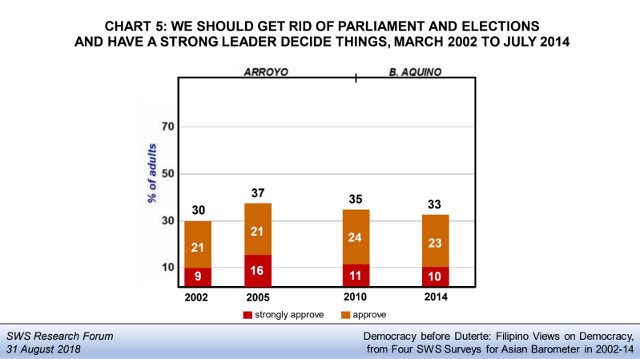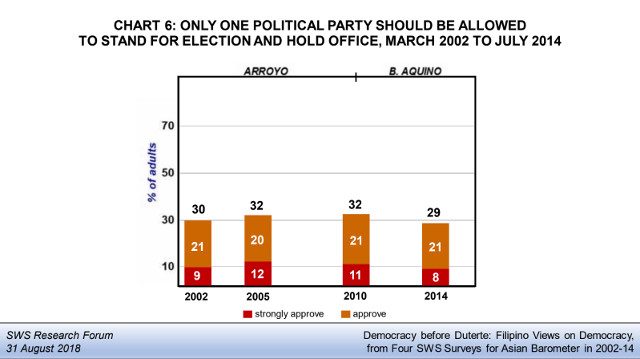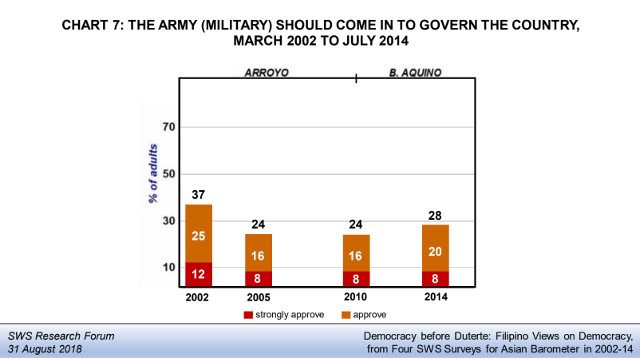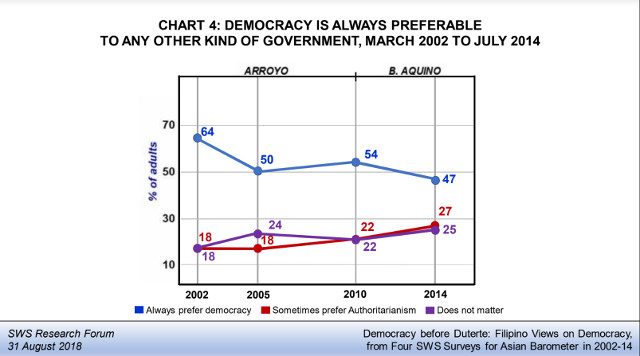SUMMARY
This is AI generated summarization, which may have errors. For context, always refer to the full article.

MANILA, Philippines – Surveys held from 2002 to 2014, or before the administration of President Rodrigo Duterte, show that one in 3 Filipinos were open to certain aspects of authoritarian regimes.
Surveys conducted by Social Weather Stations (SWS) for the Asian Barometer public opinion research program found that around a third of Filipinos approved of scrapping elections in favor of a “strong leader,” allowing only one political party to rule, and even having the military take over the government.
Political science professor Gene Pilapil bared the survey results during a forum in Quezon City on Friday, August 31, in the paper “Democracy before Duterte: Filipino views from Four Surveys for Asian Barometer in 2002-2014,” that he presented with Iremea Labucay, SWS Fellow and Deputy Director for Cross-Cultural Surveys.
Three surveys were held during the administration of Gloria Macapagal Arroyo, while the other one was conducted 4 years into the presidency of Benigno Aquino III. Each survey was part of a particular “wave” of surveys for ABS conducted in select economies in Asia.
- March 4 to 23, 2002 (Wave 1)
- November 25 to December 5, 2005 (Wave 2)
- March 3 to 7, 2010 (Wave 3)
- June 30 to July 5, 2014 (Wave 4)
Surveys under Wave 5 will be held in October, over two years into the Duterte presidency.
ABS is an applied research program on public opinion, values, democracy, and governance around the region
Desire for strong leader
The 1,200 respondents were asked if they strongly approve, approve, disapprove, or strongly disapprove of “alternatives” to ways of governance.
Pilapil said the surveys for ABS specifically did not use the word “democracy” because there is a “social desirability bias” for the term. This means that people are bound to say they prefer democracy just because of the positive connotations associated with it, not necessarily because they agree with and understand democratic tenets.
Respondents were asked about their level of agreement with the statement, “We should get rid of parliament and elections and have a strong leader decide things.”
In March 2002, 30% said they approve (9% strongly approve, 21% approve). This rose to 37% in December 2005, then dipped to 35% in March 2010, months before Arroyo’s term ended. Approval was at 33% in July 2014.

The same pattern could be found among respondents who were asked it they approve of the phrase, “Only one political party is allowed to stand for election and hold office.” The percentage of those who approved of this stayed within the range of 29% to 32%.

So too with approval for the phrase, “The army (military) should come in to govern the country.” In 2002, 37% agreed with this. In 2005 and 2010, 24% agreed. Come 2014, 28% agreed with this statement.

Ateneo School of Government Dean Ronald Mendoza, after listening to the presentation, said these numbers show that “a third of us appear to be much more open to strongman rule and not necessarily democratic governance.”
Decline in preference for democracy
Results for other survey questions still show a majority of Filipinos are satisfied with democracy. Interestingly, satisfaction with democracy reached an all-time high under Duterte, a president criticized for his strongman tendencies.
SWS recorded the highest ever satisfaction for democracy – 86% – in September 2016, a few months after Duterte took office. In March this year, satisfaction with democracy was at 78% while only 19% sometimes preferred authoritarianism.
SWS president Mahar Mangahas said “satisfaction with democracy peaks during election years” when Filipinos get to exercise their cherished right to vote for their leaders.
Public satisfaction with Philippine democracy had peaks of 70% in September 1992, 70% in July 1998, 68% in June 2010, and the record-high 86% in September 2016, related to the successful presidential elections of 1992, 1998, 2010, and 2016, respectively.
It was a different story in June 2004, after the controversial victory of Arroyo against the late Fernando Poe Jr in the presidential elections, when Filipinos’ satisfaction with the way democracy works was at 44%.

However, there was a decline in preference for democracy from the Arroyo administration to the Aquino presidency, coupled with an increase among those who “sometimes prefer authoritarianism.”
The survey results showed that 64% of Filipinos said they “always prefer democracy” to any other kind of government in 2002, but this slid to 47% by 2014.
In 2002, 18% said they sometimes prefer authoritarianism. This increased to 27% in 2014.
‘Spurious democrats’
The Friday presentation also showed that there are Filipinos who proclaim preference for democracy but, at the same time, prefer non-democratic alternatives.
Pilapil calls such persons “superficial democrats” or “spurious democrats.”
This was demonstrated by survey results where one-third of persons who said democracy is the best kind of government also strongly approve or approve of canceling elections and letting a strong leader take over.
Even a third or slightly more of people satisfied with democracy also agreed with nixing elections in favor of a strong leader.
Pilapil said this shows the “hybrid” nature of how some Filipinos want to be governed. “Some citizens value some type of democracy, but at the same time want strong-arm tactics from their governments,” he said.
It could also be that Filipinos simply have different ways of understanding democracy. Another Asian Barometer survey showed that 30.4% of Filipinos understand democracy as an ensurer of social equity – that the disadvantaged will be protected and a minimum living standard upheld.
Meanwhile, 26.6% of Filipinos view democracy as protecting freedoms and civil rights such as rights to free expression and religion. This is compared to 21.6% who equate democracy to good governance and 21.4% who think democracy is about norms and procedures, such as holding elections and the presence of checks and balance.
The presentation of the survey results comes at a time when the Philippines is not faring so well in terms of democracy indicators.
The Philippines slipped 6 spots in the 2018 World Press Freedom Index owing to the Duterte administration’s moves to silence or pressure media, a key player in any democracy. In January, Human Rights Watch declared a “human rights crisis” under Duterte.
Duterte’s martial law in Mindanao was also said to have “adversely affected” Philippine democracy, according to Economist Intelligence Unit’s Democracy Index.
SWS has been polling Filipinos on their views on democracy since the administration of the late President Cory Aquino in November 1991. – Rappler.com
Add a comment
How does this make you feel?
There are no comments yet. Add your comment to start the conversation.